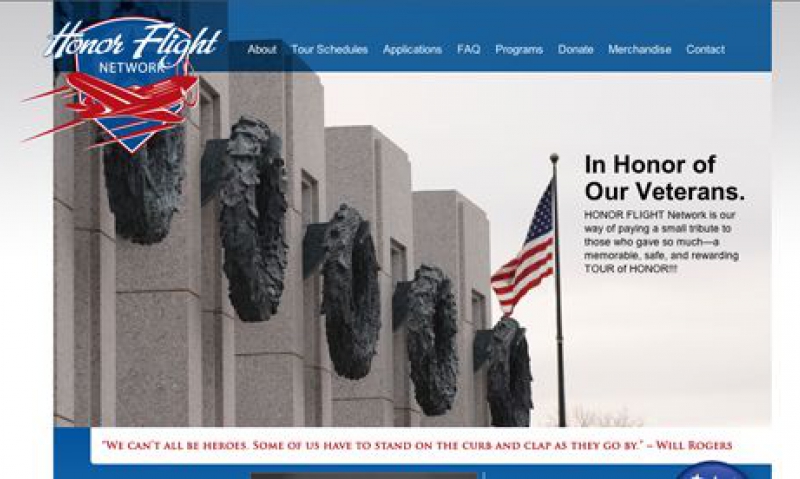
A costly, yet worthwhile venture
The easiest way to give an octogenarian veteran10 years of his life back: take him on an Honor Flight, the program that flies World War II veterans to Washington, D.C., for a sightseeing tour and a 65-years-later thank you.
The programs, which exist all across the country as part of the Honor Flight Network, pay all expenses for veterans of World War II to see their memorial, which wasn't dedicated until 2004. They also visit other D.C. sites and usually get a mini parade – flags, the brass band, the works.
But time is running out for these veterans, who by now are in their mid-80s or older. About 850 World War II vets die each day.
Besides time, the enemy is money; chartering a plane for 80 senior citizens and their "guardians" – the younger folks there for companionship and safety – costs thousands. The poor economy hasn't done charitable giving any favors.
“There are so many veterans and so little time,” said Brian Duffy, organizer of Honor Flight Bluegrass in Louisville, Ky. “With economic times being what they are, that's accentuating [the problem]."
The chapter has been flying since 2005 and transported more than 700 veterans – a success by any standard – but still had to cancel a flight last fall simply because the money wasn't there.
Duffy and his team could have fielded a smaller flight, but it made economic sense to wait. On the other hand, waiting meant that some veterans, already frail, might not be in shape to travel. "I think some of them didn't make it," Duffy said. "I don't know definitively, but if I looked at it, I'd be getting a little wet in the eyes."
Chapters farther west usually struggle more with fundraising. A flight leaving from the west coast takes longer and costs more than a flight from Ohio, and usually necessitates an overnight stay, driving costs up. "We're fighting upstream, like the salmon," said Barbara Brownlie, who directs Honor Flight Tucson. "We're going to make it happen.”
Other chapters have, for whatever reason, been luckier with cash flow. Honor Flight Cleveland found itself with a high-school sophomore who raised $15,000 by biking from Pennsylvania to D.C. That paid for two flights by itself, president Joe Benedict said.
Honor Flights Omaha took 1,500 Nebraska vets over seven flights and at a cost of $1.2 million, enough to close the chapter with no more veterans on the waiting list.
All Honor Flight hubs share a few characteristics. They are nearly all volunteer-run. They operate on shoestring budgets. Most have a pass-through rate of 95 percent or higher, which means they spend no more than 5 percent of revenues on administrative costs – nearly inconceivable within the nonprofit world.
And it eventually takes its toll.
Louisiana Honor Air, a group which shares the mission of Honor Flight but is a separate organization, took its last trip to D.C. Saturday. More than 100 vets made the journey.
Organizer T.D. Smith had planned just one trip in 2007. That grew to four. Twenty-two flights later, they've flown more than 2,000 veterans from Louisiana, and everyone's just a little tired, said office manager Sallie Varrelman, herself in her 80s. The May 29 flight was already an encore, with the team deciding that last fall's final couldn't be the end, not with a three-ring binder full of names on the waiting list.
There are a few more veterans on the list who couldn't make the encore flight, but Honor Air is done. The volunteers need to rest. But this isn't, they hope, the end.
"I'm keeping the database [of names]" Varrelman said, "and I will pass it on to whatever group will form after us."
Rachel Kaufman is a freelance writer based in Washington, D.C.
To read about a recent Honor Flight, click here.
